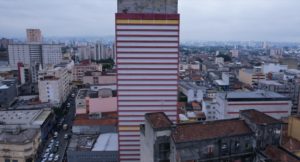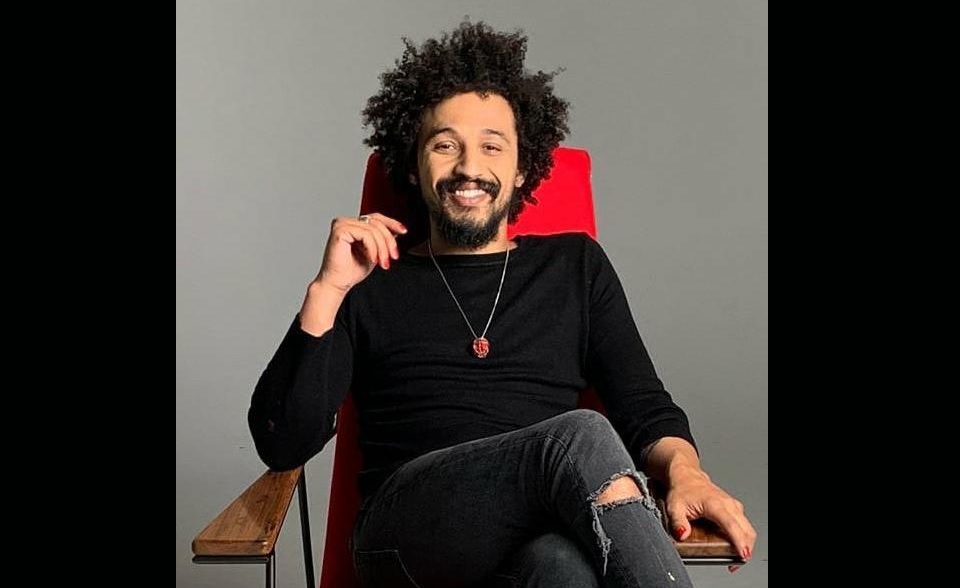São Paulo – An artwork honoring the Arab immigrants is being produced on the façade of the Garagem Automática Senador building in the historic center of the city of São Paulo. Due to be unveiled on July 5, the work is the brainchild of Brazilian artist Kleber Pagú (pictured), who is also responsible for its conception. Fernanda Bueno is the curator, and did the research with Heloísa Abreu Dib. The project is by Axé no Corre Produções, a company owned by Pagú and Bueno.
The building is almost at the corner of Avenida Senador Queirós and Rua 25 de Março, an Arab neighborhood and a strong symbol of immigration and entrepreneurship of this community in São Paulo. It was there that the Arabs were first welcomed upon reaching the city and set up their stores. The work also pays tribute to the 70th anniversary of the foundation of the Arab Brazilian Chamber of Commerce (ABCC), which sponsors the project with the support of the Federation of Muslim Associations in Brazil (FAMBRAS) and certifier Cdial halal.
The installation includes painting, lightning and other materials like rigid EPS. Its predominant color will be gold, and it will feature an arabesque, an Arab symbol. “Brazil has the largest Italian, Japanese, Portuguese and Arab communities. There’re more Lebanese in Brazil than in Lebanon. We want to display this capacity to embrace sets of migrations and talk about these cultures, learn about our history with the city, search for the ancestry with access to information,” Pagú said in an interview with ANBA, stressing his African ancestry.
The Garagem Automática Senador building is considered an architectural icon of the city since its opening in 1967, with its 29 floors, the highest garage building in Brazil and Latin America at that time. It was built by the family of Zaki Dib, a Syrian immigrant from the city of Homs. The family runs the building to this day, and Zaki’s granddaughter Heloísa Dib is responsible of the project. She’s the one who was first contacted by Pagú. They presented the project to the ABCC and approved the art that focuses on immigration and the contributions of the Arabs to São Paulo and Brazil.

“I saw a call on the newspaper for buildings interested in receiving artistic interventions, and I submitted the building. I wanted to use the free walls to put an installation related to the Arab immigration. I brought the this idea to my family, and they approved it,” Heloísa told ANBA.
“We took into consideration the proximity to the Rua 25 de Março. The geography of each installation is very important, and the story we are going to tell is very important. This was São Paulo’s first garage building, 70 meters tall. Finding the Avenida Senador Queirós, finding this family, the issue of Arab immigration, an iconic architecture that has been forgotten, all this was taken into account to conceive the project,” Pagú said.
The research project by Fernanda Bueno and Heloísa Dib took about a year, the artist said. “The color of the monument is golden, not yellow; it is golden because one of the many contributions of the Arab peoples is using gold as a currency, as something actually commercial. We have brought in the arabesques, too, and developed the art,” he said.
ABCC Cultural director Silvia Antibas said the work is symbolic for the Arab community and for celebrating the 70th anniversary of the ABCC as it is very close to the Rua 25 de Março.
“The arabesque symbolizes the whole Arab community, its symbiosis and integration to the community in the center of the city, in a street that represents exactly the entrepreneurship of the immigrants. It was there that they got together and settled, where they could listen to Arab music, read Arabic newspapers. Other groups came with the institutional immigration, with jobs in farms, for example. But the Arabs came on their own, and this is where they were welcomed,” Antibas told ANBA.
“There’s nothing better than honoring the Rua 25 de Março in a building that will give great visibility to the project and will be a present to the city of São Paulo,” she finished.
The building is receiving gold paint as of Thursday (23), anyone passing through the city center can watch the work live.
This is the first of the four-part project “Monument to Arab Immigration,” which includes other three building façades. Pagú and Bueno seek sponsorships to finish the project. “There is no monument in the city of São Paulo that looks like this. The building is the monument,” Pagú said. Each façade tells a part of the history of Arab immigration and its contributions to humanity in Medicine, Architecture, Algebra, and others.
Pagú’s portfolio includes over 200 art installations in Brazil and elsewhere. “I aim at rethinking the city, public spaces, art, culture and information,” he said.
Contact info
Pagú and Fernanda Bueno
Axé no Corre Produções
axenocorre@gmail.com
(11) 99398-9761
(11) 99958-2888
Translated by Guilherme Miranda




